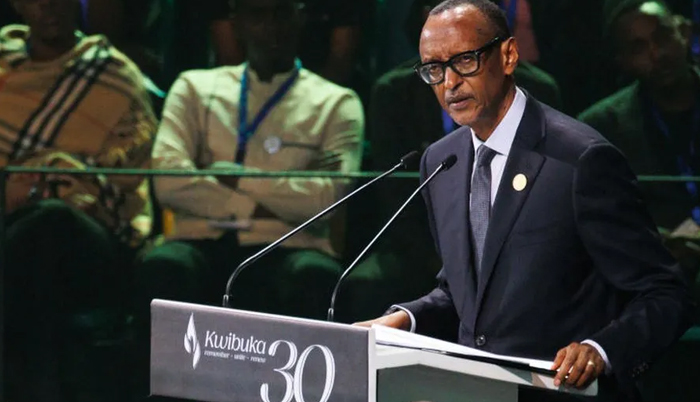![]() Home > Africa
Home > Africa
Rwanda Genocide: World Failed Us In 1994, President Paul Kagame Says

GETTY IMAGES | Rwanda's President Paul Kagame said the country was "humbled by the magnitude of our loss"
![]() April 8th, 2024 | 00:25 AM |
April 8th, 2024 | 00:25 AM | ![]() 1519 views
1519 views
RWANDA
Rwanda's president said the international community "failed all of us", as he marked 30 years since the 1994 genocide that killed around 800,000 people.
President Paul Kagame addressed dignitaries and world leaders who had gathered in Rwanda's capital, Kigali, to commemorate the bloodshed.
"Rwanda was completely humbled by the magnitude of our loss," he said.
"And the lessons we learned are engraved in blood."
On this day in 1994, extremists from the Hutu ethnic group launched a 100-day killing spree, in which members of the Tutsi minority and Hutu moderates were slaughtered.
The mainly Tutsi forces who took power following the genocide were alleged to have killed thousands of Hutu people in Rwanda in retaliation.
On Sunday, Mr Kagame and a group of dignitaries placed wreathes on mass graves at the Kigali Genocide Memorial - where more than 250,000 victims are believed to be buried. The president also lit a remembrance flame.
In a speech later, Mr Kagame thanked fellow African countries including Uganda, Ethiopia and Tanzania for their assistance in accepting Tutsi refugees and ending the genocide.
"Many of the countries representing here also sent their sons and daughters to serve as peacekeepers in Rwanda," he said.
"Those soldiers did not fail Rwanda. It was the international community which failed all of us. Whether from contempt or cowardice."
The failure of other nations to intervene has been a cause of lingering shame.
Former US President Bill Clinton, who was among the visiting leaders present, has called the genocide the biggest failure of his administration.
In a video message recorded for the memorial, French President Emmanuel Macron acknowledged that his country and its allies could have stopped the genocide but lacked the will to do so.
France, under then-president François Mitterrand, was a close ally of the Hutu-led government of Juvenal Habyarimana prior to the killings, and Rwanda has accused France of ignoring or missing warning signs and of training the militias who carried out the attacks.
France has consistently denied complicity, but a report commissioned by Mr Macron three years ago concluded that France bears "heavy and overwhelming responsibilities".
French Foreign Minister Stéphane Séjourné attended the ceremony in Kigali in place of Mr Macron on Sunday. Other visiting dignitaries included Ethiopian Prime Minister Abiy Ahmed, South African President Cyril Ramaphosa, and Israel's President Isaac Herzog.
Sunday's events mark the beginning of a week-long mourning period across Rwanda. Music, sport and films will be banned from broadcast on radio or TV and national flags will be flown at half-mast.
The streets of Kigali have been unusually quiet, according to the BBC team there, with no traffic, many shops closed, and few pedestrians.
The genocide was sparked on the night of 6 April 1994, when Hutu President Juvenal Habyarimana was assassinated - the plane he was on was shot down.
Hutu extremists blamed the Tutsi RPF rebel group, and launched a well-organised campaign of slaughter.
Their victims were shot, beaten or hacked to death in killings fuelled by vicious anti-Tutsi propaganda spread on TV and radio.
Thousands of Tutsi women were abducted and kept as sex slaves.
After 100 days of violence, the RPF rebel militia, led by Mr Kagame, succeeded in overthrowing the Hutu authorities and ending the genocide.
Human rights groups say RPF fighters killed thousands of Hutu civilians as they took power - and more after they pursued Hutu militia members who had fled into the Democratic Republic of Congo. The RPF denies this.
Scars from the violence still remain, and new mass graves are still being uncovered around the country.
In the months that followed the genocide, the International Criminal Tribunal for Rwanda was set up in Tanzania.
Dozens of senior officials in the former regime were convicted of genocide - all of them Hutus.
Within Rwanda, community courts, known as gacaca, were created to speed up the prosecution of hundreds of thousands of genocide suspects awaiting trial.
According to Rwanda, hundreds of suspects remain at large, including in neighbouring nations such as DR Congo and Uganda.
President Kagame has been hailed for transforming the tiny, devastated country he took over through policies which encouraged rapid economic growth.
But his critics say he does not tolerate dissent and several opponents have met unexplained deaths, both in the country and abroad.
The genocide remains a hugely sensitive issue in Rwanda, and it is illegal to talk about ethnicity.
Source:
courtesy of BBC NEWS
by BBC NEWS
If you have any stories or news that you would like to share with the global online community, please feel free to share it with us by contacting us directly at [email protected]